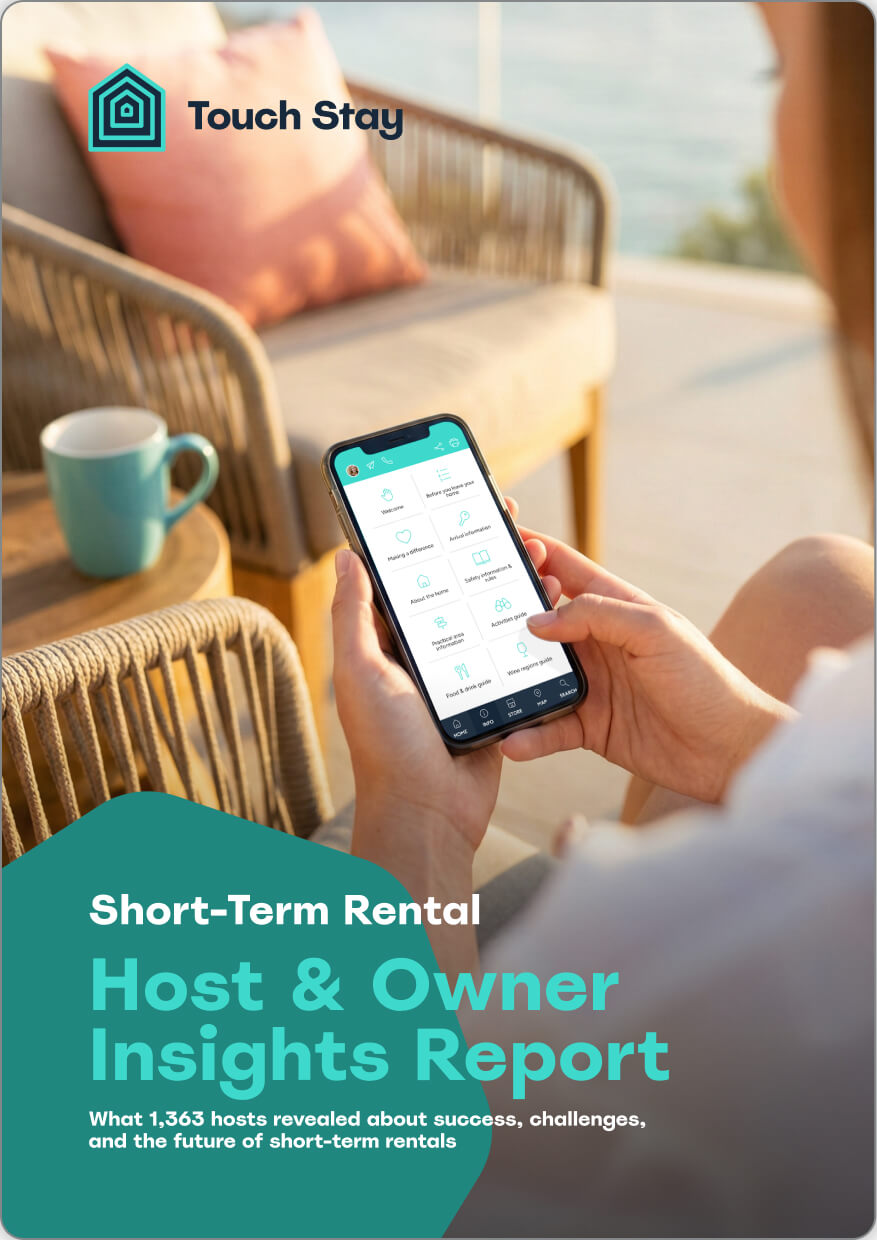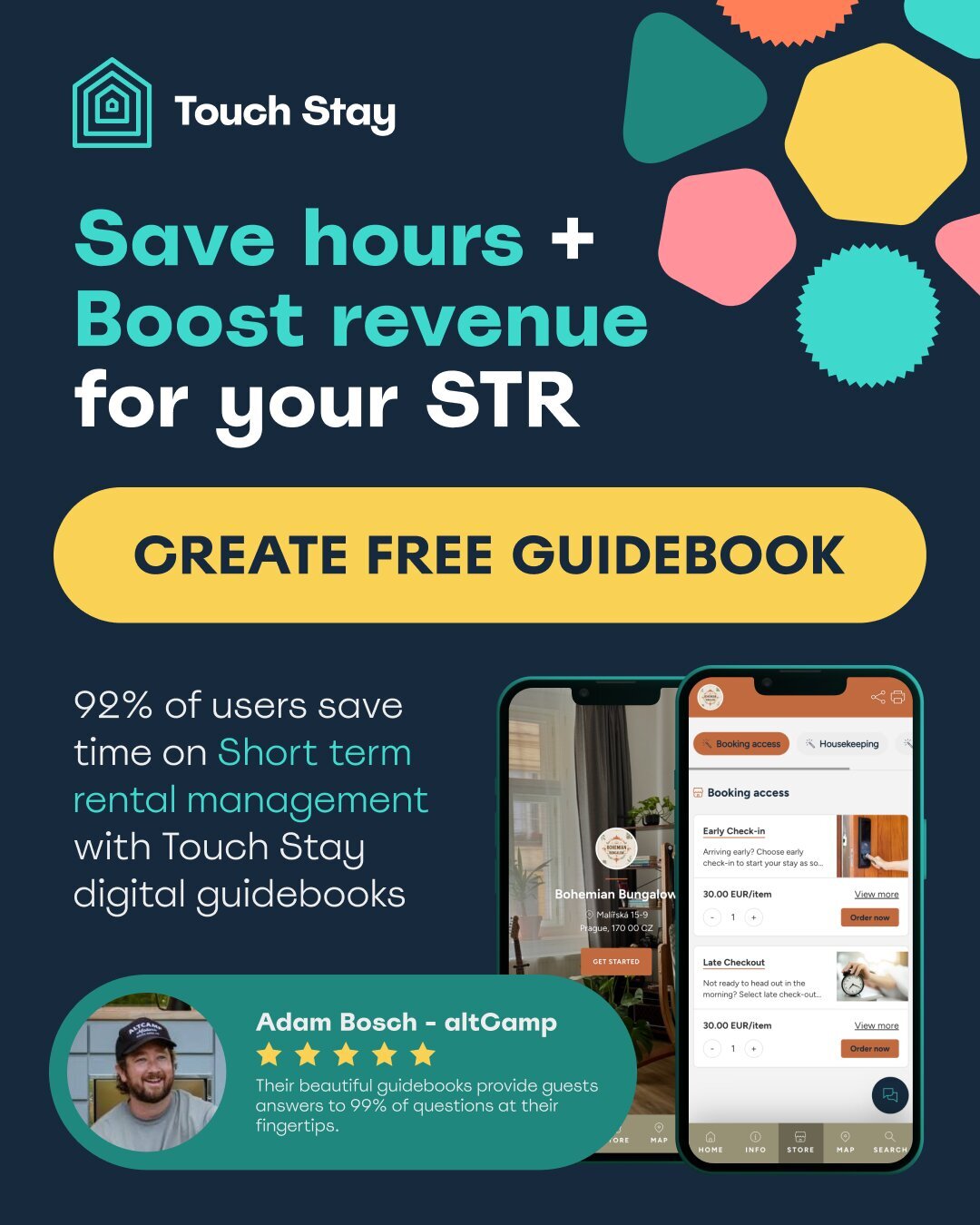Event planning has never been easier, thanks to a variety of feature-rich event apps available in 2024. These tools help streamline event organisation, enhance attendee engagement, and improve the overall event experience.
Key features of event apps include:
- Attendee management: tools to track registrations, manage RSVPs, and communicate with attendees.
- Engagement tools: real-time polling, live Q&A, and surveys to keep attendees engaged.
- Event analytics: insights into attendee behaviour, engagement, and feedback for post-event analysis.
- Networking features: facilitate connections through attendee profiles, messaging, and matchmaking.
Let’s look at the top 10 event apps for 2024, detailing their pricing and best use cases.
The top 10 event apps ranked
1. Touch Stay event app
Touch Stay is a unique event app designed for event organisers who need to provide attendees with digital guidebooks. These guidebooks centralise all event information, such as schedules, venue maps, and updates, into one easily accessible location.
Key features:
- Customisable digital guidebooks
- Offline access for attendees
- Instant updates with push notifications
- Rich media integration (maps, links, surveys, 3D tours, etc.)
Pros:
- Easy to use and navigate
- Highly customisable to fit your event’s branding
- Great for events of all sizes where attendee information needs to be centralised
Cons:
- Limited in terms of networking features compared to other apps; however, these are in the pipeline.
Pricing:
- Touch Stay offers custom pricing based on event size and needs.
Reviews:
Touch Stay is praised for its simplicity and the ability to provide digital guidebooks that reduce the need for constant attendee enquiries. One user stated, “Our event guests had everything they needed in one place, which saved us a lot of time and reduced confusion”.
2. Whova
Whova is a popular event management platform used for organising large-scale conferences and meetings. Its wide range of features helps attendees network, stay informed, and engage with event content.
Key features:
- Attendee profiles and networking tools
- Custom agendas and session reminders
- Live polling and Q&A for sessions
- Sponsor and exhibitor management
Pros:
- User-friendly interface
- Networking features that attendees love
- Detailed analytics for event organisers
Cons:
- Custom pricing can be high for smaller events
Pricing
- Whova’s pricing is customised based on event requirements.
Reviews:
Whova is highly rated for enhancing attendee engagement and making event logistics smoother. According to a user on G2, "Whova was a lifesaver for our large conference—it handled attendee networking, live polling, and Q&A seamlessly. The team loved the ability to customise the agenda".
3. EventMobi
EventMobi is ideal for small to mid-sized events, offering a customisable app for event organisers to keep attendees informed and engaged.
Key features:
- Branded event app with customisable layouts
- Live polling, surveys, and session feedback tools
- Attendee registration and ticketing options
- Real-time notifications and updates
Pros:
- Affordable and scalable pricing
- Simple, user-friendly interface
- Good for smaller events
Cons:
- Not as feature-rich for large-scale or hybrid events
Pricing:
- EventMobi pricing starts at $500, making it a more affordable option for smaller events.
Reviews:
Users appreciate EventMobi for its ease of setup and interactive features. A reviewer on G2 wrote, "EventMobi’s platform is intuitive and the gamification really helped us keep attendees engaged throughout our event".
4. Bizzabo
Bizzabo is designed for hybrid events, offering solutions to manage both virtual and in-person experiences in a seamless manner.
Key features:
- Hybrid event tools for both virtual and in-person attendees
- Advanced analytics and reporting
- Custom registration and ticketing systems
- Interactive attendee engagement tools (polls, Q&A)
Pros:
- Excellent for managing hybrid events
- Advanced marketing and analytics tools
- High degree of customisation
Cons:
- Custom pricing can be costly for smaller events
Pricing:
- Bizzabo offers custom pricing based on the event’s size and specific requirements.
Reviews:
Bizzabo stands out for hybrid events. One user shared on Capterra, "Bizzabo’s hybrid tools allowed us to seamlessly manage both virtual and in-person attendees. The analytics and marketing tools are top-notch, but the learning curve is steep for beginners".
5. Socio
Socio (now Webex Events) is a platform focussed on virtual and hybrid events, offering tools for attendee engagement, custom event websites, and networking.
Key features:
- Virtual expo halls and sponsorship opportunities
- AI-powered matchmaking and networking tools
- Interactive engagement features (polling, live Q&A)
- Customisable event websites and branded apps
Pros:
- Excellent for hybrid and virtual events
- Strong networking features
- Customisable branding options
Cons:
- May be too feature-rich for simple or smaller events
Pricing:
- Socio offers custom pricing tailored to the event’s needs.
Reviews:
Socio is celebrated for its hybrid and virtual event capabilities. "The networking and engagement tools in Socio are fantastic! It made it easy for attendees to connect and for us to track engagement metrics," said a user on G2.
6. Attendify
Attendify is designed to improve attendee engagement through customised event apps, making it easier for organisers to communicate with attendees and track engagement.
Key features:
- Custom-branded event apps
- Attendee profiles and social timelines
- Live polling, Q&A, and real-time feedback
- Analytics on attendee engagement and app usage
Pros:
- Great for attendee engagement
- Customisable apps to fit your brand
- User-friendly platform
Cons:
- Starts at $999, which may be expensive for smaller events
Pricing:
- Attendify starts at $999 for basic packages, with pricing increasing based on event size and needs.
Reviews:
Attendify is known for its focus on attendee engagement and easy setup. A reviewer on G2 mentioned, "It was perfect for creating a custom-branded event app, and the engagement tools like polls and live Q&A made the sessions interactive".
7. Swapcard
Swapcard is known for its networking features, particularly its AI-powered matchmaking that helps connect attendees based on their profiles and interests.
Key features:
- AI-powered matchmaking and networking
- Customisable event agendas
- Virtual and hybrid event management tools
- Live engagement features like polls and Q&A
Pros:
- Top-tier networking features
- Easy to navigate and customise
- Excellent for conferences with a focus on attendee interaction
Cons:
- Custom pricing can be high depending on the event
Pricing:
- Swapcard offers custom pricing based on event size and features.
Reviews:
Swapcard excels at matchmaking and networking for events. According to a user on Capterra, "The AI-powered networking was a game-changer for our event. It connected attendees based on interests, which was very effective for engagement".
8. SpotMe
SpotMe is a robust event platform, designed for enterprise-level events, offering tools for event engagement, virtual booths, and more.
Key features:
- Custom event apps and websites
- Virtual expo booths and sponsor opportunities
- Engagement features like polling, surveys, and Q&A
- Enterprise-level analytics and reporting
Pros:
- Excellent for large, enterprise events
- Highly customisable to fit specific branding and needs
- Powerful engagement and networking tools
Cons:
- Custom pricing may be too high for smaller events
Pricing:
- SpotMe operates on a custom pricing model based on your event’s size and complexity.
Reviews:
SpotMe is praised for enterprise-level event management, particularly for virtual expos. A user on G2 noted, "SpotMe made it easy to manage our virtual sponsor booths and track attendee interaction, which provided great ROI for our sponsors".
9. Eventee
Eventee is a user-friendly event app that focuses on simplicity and ease of use, making it ideal for smaller events and gatherings.
Key features:
- Free version with premium upgrades
- User-friendly mobile app for attendees
- Agenda management, polls, and live Q&A
- Social media integration for event promotion
Pros:
- Free version available for smaller events
- Intuitive and simple to use
- Great for smaller gatherings with fewer complex needs
Cons:
- Limited features compared to larger event apps
Pricing:
- Eventee offers a free version, with premium plans available for larger or more complex events.
Reviews:
Eventee is appreciated for its user-friendly interface, especially for smaller events. One reviewer said, "Eventee was so simple to set up, and the free tier was perfect for our small event. The live Q&A and polls helped keep attendees engaged throughout".
10. Brella
Brella is a networking-focused event platform, providing powerful matchmaking tools to help attendees connect based on shared interests and goals.
Key features:
- AI-powered matchmaking and networking
- Video meetings for virtual or hybrid events
- Custom agendas and session management
- Engagement tools like polls and surveys
Pros:
- Superior networking features
- Simple, intuitive interface
- Works well for both virtual and in-person events
Cons:
- Custom pricing may be high for small events
Pricing:
- Brella operates on a custom pricing model, depending on event size and features.
Reviews:
Brella is highly recommended for networking-heavy events. A user on G2 shared, "Brella’s AI-powered matchmaking tool is excellent for fostering meaningful connections between attendees. It’s our go-to for events focussed on networking".
How we chose the best event apps
We evaluated the best event apps based on the following criteria:
- Ease of use: we considered how intuitive and user-friendly the app is for both organisers and attendees.
- Features: we looked for apps that offer comprehensive event management tools, including attendee engagement and networking.
- Pricing: we factored in the cost of the app and the value it provides based on its feature set.
- Scalability: apps that can handle events of various sizes, from small gatherings to large conferences, ranked higher.
- User reviews: feedback from actual users helped us assess the performance of each app in real-world scenarios.
Conclusion
Choosing the right event app can greatly impact the success of your event. Whether you're hosting a small, intimate gathering or a large-scale conference, the options in this guide—like Touch Stay for digital guidebooks, Whova for conferences, and Brella for networking—offer a range of features to suit different event needs.
Take time to evaluate your event's requirements and select an app that will enhance both your planning process and your attendees' experience.
Want to try Touch Stay for free?

Ned
Ned has clocked up over 11 years in digital marketing and comms, with a strong focus on creating engaging content for a range of brands and agencies. When he’s not writing, he can be found digging for records, peering through his telescope at the night sky, or onboard his local lifeboat where he volunteers as a crewmember.
Be the first to know!
Join our newsletter for early access to:
- ✅ Free guides
- ✅ Pro tips & tricks
- ✅ Time saving tutorials
- ✅ Latest blog posts
- ✅ Checklists & templates





















.png?width=50)